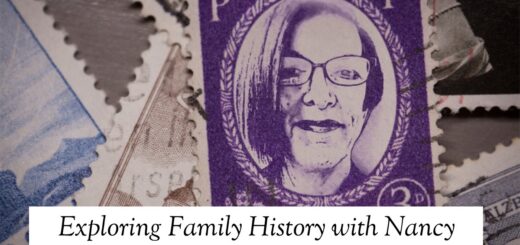Psychic Roots

If you’re a genealogist, October seems to be a good month to blog about psychic roots!
Have you experienced coincidence or serendipity in your life? That chance combination of events over which you don’t have control but which nonetheless is beneficial to you in some unexpected way? This happens in genealogy, too! A researcher feels drawn to a particular place, or looks in a particular book or set of records for one thing, but instead discovers something very important to their research that he or she was not looking for, or even thinking about, at the time.

Henry Z “Hank” Jones, Jr. has written two intriguing books on this very subject. The first is Psychic Roots: Serendipity & Intuition in Genealogy (Baltimore: Genealogical Publishing Co., 1993, repr. 2008), and the second is More Psychic Roots: Further Adventures in Serendipity & Intuition in Genealogy (Baltimore: Genealogical Publishing Co., 1997, repr. 2003). He has been actively climbing family trees since he was eight years old, when he found an old trunk filled with fading tintypes, family letters, and old newspaper clippings in the basement of his parents’ home in San Leandro, California. Hank also had a successful twenty-year career as an actor in films and television. He is the first professional genealogist to publicly propose the idea that our ancestors want us to find them, that they will use various ways to get us to do that, and that these ways are not always based solely on the usual solid, scholarly research methods. You can read more about Hank here.
Certainly chance or dumb luck could take a researcher straight to a record located in an unlikely place, or to an ancestor’s second wife we didn’t even know existed, or some other seemingly improbable occurrence. But is it truly luck or chance? In each book, Hank Jones describes some of his own encounters with uncanny experiences, as well as those described by other genealogists from around the world; well over three hundred hobbyists and professionals discuss their experiences in light of synchronicity (meaningful coincidence), intuition, genetic memory, and serendipity. The concept of genetic memory avers that behavior can be affected by events in previous generations which have been passed on to descendants through a form of genetic memory. After reading both books, readers might at least consider the sixth sense as important in genealogical research, but that will be up to the individual. Some lively debate still goes on in the genealogical community about this phenomenon.
Following are some examples of what could be considered psychic roots experiences, a couple of which are in the Jones books:
A genealogist in California:
She was at the Family History Center in Los Angeles, California, looking at Arkansas records for information on the Hamby family. The Hambys had nothing to do with the Sturgell family of Missouri, Ohio, and Virginia, whom she’d been studying for quite some time. After twelve years of getting nowhere with her Sturgell problem, she stumbled onto the third marriage of her Isaac Sturgell in Pope Co., Arkansas while looking in the records there for the unrelated Hambys! There was no way to explain it, she said.
A genealogy librarian in New Jersey:
“You should have seen the look I got when I told a woman there is a town called West New York in New Jersey. She had been researching her family in western New York State. I suggested we try West New York, New Jersey. I just happened to have the vital records microfilm roll on permanent loan at the Mormon family history center. It took less than 10 minutes to find her family.”

Two genealogists in California:
“In the early 1990s, my friend Linda and I were on the phone one day and she was telling me about a problem she had with one of her husband’s German families, the Whitmers, who spent some time in Rockingham Co., Virginia in the late 1700s. She was trying to identify one Valentine Whitmer, son of John and Catherine. I said that’s weird – two of my husband’s German ancestral families – Bender/Painter and Danner/Tanner – were in that county around that time, too. There was NO connection between our lines. Plus, Rockingham was a ‘burned’ county; once in 1787 and again in 1864, and records are incomplete. The Whitmers were Lutheran, like Carl’s Danner/Tanner family. I told Linda I had this single photocopied page in this family’s file from a Rockingham Co. Lutheran church baptism book but hadn’t looked at it for some time; it was just one page from one church book, and there were a number of Lutheran congregations in that county at the time. Besides, someone else who was working on the Danner/Tanner line had sent me a copy of this page because I didn’t have access to the book. Trying to help anyway, I found the page and came back to the phone. Second from the bottom was the Danner baptism – but on the last line of the page, immediately below Danner, was the baptism of one Valentine Whitmer, son of John and Catherine! Linda was beside herself.”
A genealogy librarian in Texas:
“The one incident that sticks out the most in my mind concerned a patron named James. He had been looking for this one family in the 1850 census for ages but could not find them. He was working with a common last name – Smith. He decided to come to the library and scroll through the county one more time. As he was going page by page through the census records the microfilm reader broke. He came to the public service desk to tell me about it and I told him would grab the pliers and head his way. As I was walking towards him he turned and looked at me. His face was white and had this look of shock on it. When I finally got beside him he just pointed his finger to the image on the screen. There was the family he was looking for! The microfilm reader had broken down on the exact page they were on, listed not as Smith but under the surname of the farmer they were living with. I always thought the Gods were at work here.”

You’ll find many more stories like these in Psychic Roots and More Psychic Roots. However, all of this is not to say that you should forget about rock-solid research methods and careful documentation and whip out the Ouija board to find long-lost Uncle Frank. Sound research principles should always be followed first and foremost in doing genealogical research. But the unusual experiences of genealogists, amateur and professional, cannot be totally dismissed, because they produced needed results, even if they weren’t expected. You might even go so far as to think of psychic roots as a research tool that hands itself to the genealogist when he or she least expects it.
In thinking about all this, it may help to consider the observations made by French microbiologist and chemist Louis Pasteur, and Henri Poincaré, French mathematician and theoretical physicist. During an 1854 lecture at the University of Lille, Pasteur observed that, “In the fields of observation chance favors only the prepared mind.” Poincaré, in his 1905 text Science and Hypothesis, said, “It is by logic that we prove, but by intuition that we discover.”
For a couple of truly intriguing and even spine-tingling reads, check out Psychic Roots and More Psychic Roots from the circulating collection in the Frances Pittman Malcolm Genealogy Room.





Recent Comments